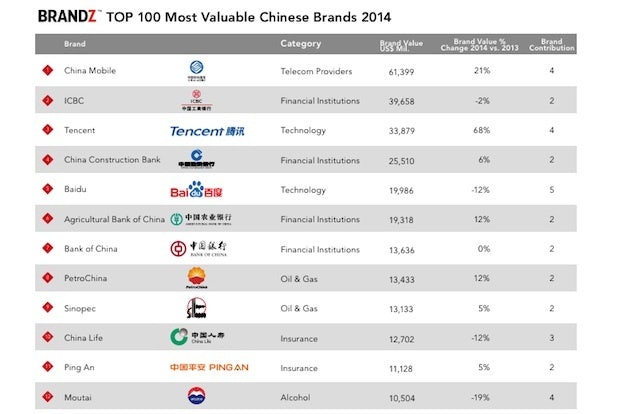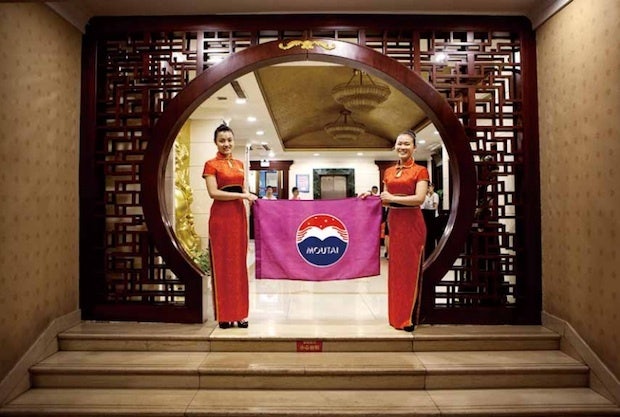
Growing Chinese incomes and more leisure time are benefiting Chinese travel companies, but not wine and spirits brands, according to market research firm Millward Brown's new BrandZ To 100 Most Valuable Chinese Brands report for 2014.
The report, which catalogs brands’ overall “value” based on several key criteria, found that China’s tourism boom is fueling rapid growth for Chinese travel agencies and development of Chinese hoteliers at all segments of the market. In contrast, the government’s austerity drive has caused Chinese alcohol companies to take a hit, especially when it comes to wine and baijiu. While travel agencies such as Ctrip saw a massive 98 percent increase in brand value compared to last year’s report, alcohol companies such as Moutai declined by 6 percent. Meanwhile, several hotel companies have made their way onto the list for the firs time this year, further emphasizing the benefits of the domestic travel boom.
When it comes to alcohol, baijiu makers such as Moutai and Wu Liang Ye and wineries such as Great Wall and ChangYu struggled in a continued year of China’s crackdown on official banquets and luxury gifting. Moutai, which came in at 12th, declined in the “brand value” by 19 percent, according to the report’s assessment, while Wu Liang Ye, listed at number 46, declined by 66 percent. Moutai faced difficulty in sustaining bottle prices this year, and the company’s stock “declined to new lows” in 2013. “As distributors sought to drive sales with price-cutting, Moutai’s attempt to maintain price stability ended in government anti-trust action,” said the report.

Moutai has been struggling this year amidst the Chinese government's anti-graft campaign. (Millward Brown)
Meanwhile, Swellfun’s Diageo-owned Shui Jing Fang “felt the impact of new government regulations aimed at taming extravagant spending,” and its Shanghai-listed share price dropped by 50 percent in September this year. One bright spot for baijiu this year was Yanghe, which made the list for the first time at number 27 and “successfully repositioned the brand toward the mid-price part of the baijiu market.” In addition, it engaged in several corporate social responsibility (CSR) initiatives, including an eco-friendly marketing campaign and sponsored charity events.
Chinese wineries Great Wall and ChangYu were also hit by the government’s anti-extravagance campaign, as well as by foreign competition. ChangYu’s value declined by 53 percent, placing it at 36th on the list, while Great Wall was listed in 95th place. ChangYu clearly sees the slump as temporary, as it’s moving ahead with expansion in the country, including the construction of its $1 billion “wine city” expected for completion in 2016.
Both baijiu and wine companies are hoping overseas sales will mitigate their domestic slump. Moutai has been looking abroad with new marketing campaigns and a Bordeaux winery in France, while Diageo has been marketing the brand in the UK, Italy, Qatar, Spain, and the United Arab Emirates. Luzhou Laojiao, which was listed at 47th, is now sold in over 40 countries, and ChangYu introduced “its brand at premium and popular prices overseas,” selling a mass-market line called ViniPanda.
In contrast, hotel and travel agencies are benefiting from a local travel boom. Online booking agent Ctrip ranked at 54 this year with a brand value increase of 47 percent. Mobile is playing a huge role in its gains: according to the report, mobile transactions for the company tripled in the second quarter of 2013, and its app was downloaded over 50 million times. According to the report, the mobile boost was driven by “young consumers with disposable income and leisure time,” leading to a “76 percent year-on-year profit increases for the second quarter.”
China International Travel Service (CITS) was new to the list this year at 83rd, benefiting from both foreign and domestic travelers. In addition, several hotels made the list for the first time, including Home Inn (57th), Hanting (84th), Huatian (89th), and Jinjiang (96th). While Hanting and Jinjiang manage a range of hotels spanning from budget to luxury, Huatian is developing its luxury hotel brand everywhere from Hunan to Paris. In the Hunan city of Loudi, the company is planning a major development including a five-star hotel, furnished apartments, residential buildings, a conference center, a business complex, and entertainment and retail.
For more of the latest research on the luxury industry in China, check out our reports page.